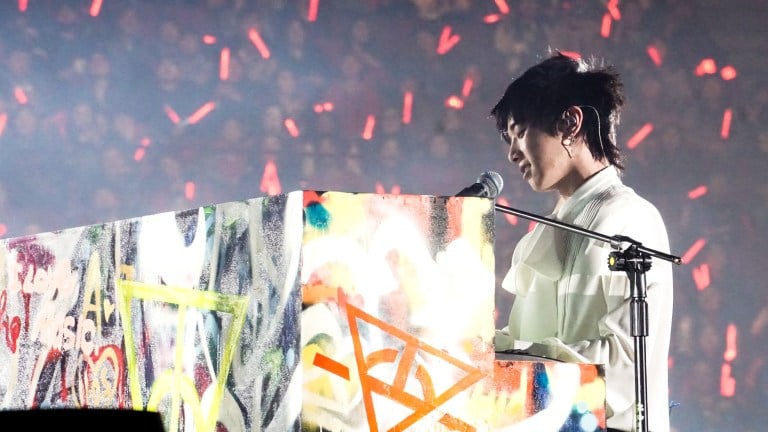Hua Chenyu is one of the most influential young pop-rock singers in China today. His most recent solo concert was held at Beijing National Stadium — originally built for the 2008 Olympics with a capacity of 80,000 — and was sold out in two minutes and 58 seconds. A child of the ’90s, he rose to prominence after winning the Chinese reality singing competition SuperBoy 2013. On the show, Hua shined with his awkward lovability, iconically auditioning with a self-composed “lyric-less” song in which he half-wailed until a judge asked him whether he had a happy life.
“Yes!” he replied.
“Then where did you get the inspiration for … this?”
“Actually, I was a bit socially awkward in the past. Once, I locked myself up for six months, never going outside the house … then suddenly, I had the inspiration for this song.”
Since then, Hua has swapped his thick glasses for gradient copper eyeshadow, his white t-shirts for skinny jeans and black clothing. Over the years, his aesthetic has taken on an interesting mix of grunge, punk and immaculate flower-boy. But the themes that obsess him remain the same: childhood, temporality, loneliness.
Perhaps his strange popularity lies in this: Hua remains awkward, but not painfully so. He is awkward enough to remind us of our own vulnerabilities, but refined enough in his artistic sensibilities to avoid spiraling into unforgivable shame.
On The Singer 2018 (another Chinese reality singing competition, this one pitting established artists against each other), Hua returns as a seasoned veteran of the stage. His cover of Cui Jian’s “Fake Monk” on the tenth episode of the show is a perfect performance of solitude, a song I’ve been listening to on repeat in the steady adjustment to college life. Something about the performance is hypnotic: It may be the neon blue and pink beams cutting the darkness of the auditorium, splitting Hua’s face in half. It may be the simple instrumentation, a syncopated pulse of perfect fourths and minor thirds which accompanies his vocals, threading around his voice as he sings, “I want to walk from south to north / I want to walk from day to night / I want everyone to see me / But not know who I am.”
Indeed, the simple piano accompaniment and Hua’s voice are entangled in a rhythmic dance, neither overstepping the other. This can be attributed to his musical philosophy: Hua views his voice as just another instrument. “For me,” he says, “the composition is always the greater whole. My voice alone doesn’t matter that much.”
Yet what takes center stage in this performance is not the perfect balance of voices. It is, rather, his voice — unrefined and animalistic, hiding nothing, but revealing no more than what it is. At times he laughs, at others he wails, his vocals gliding over the notes like silk. As the song progresses, his voice undoes itself: The guttural timbre of a cry creeps in, tears off the ends of lines like, “I want to see you blossom / Without the knowledge of your pain” as the quickening pulse of the piano accompaniment drives the song into chaos. Finally, he removes all semblance of refinement as the song climaxes into screams, completely shedding the civility of sung lyric. Hua effectively creates a space for the primal and private in a public eye.
Hua never loses control. After the climax, he lifts his hands to his face, almost as if ashamed of having revealed some secret, inglorious aspect of himself. Of course, he has. Tenderly, the alternating intervals return in the keyboard. In a whisper, the song trails off.
Subject-wise, Mandarin pop (or Mandopop) as a whole veers toward the melancholic. Indeed, China’s recent history has certainly shaped its music: Commonly, songs include themes of existential confusion, and music is often the means through which artists work through pain. Hua engages with similar themes, but he infuses into them youthful unrest and explosive creativity as he remixes and rearranges. Cui’s original “Fake Monk” is jaded, voice clothed with instrumentation. With Hua, the ache is fresh and alive and crying.
Perhaps there is something more to be said about this paradoxical performance, about our desire to be both seen and unseen, known and unknown. About the pain of being by ourselves, about the pain of being with other people. Unlike other more conventional performances, these tensions are never resolved through a neat musical catharsis. The repetitive pentatonic melody upon which the entire song is built traps the listener, as does its cyclical lyrics. Instead of reaching an organized emotional conclusion, the song shatters at the climax. “I know my screaming might make the audience uncomfortable,” Hua says, “but if I’m crying, it means I’m trying my best to break free.”
Contact Enshia Li at enshia ‘at’ stanford.edu
